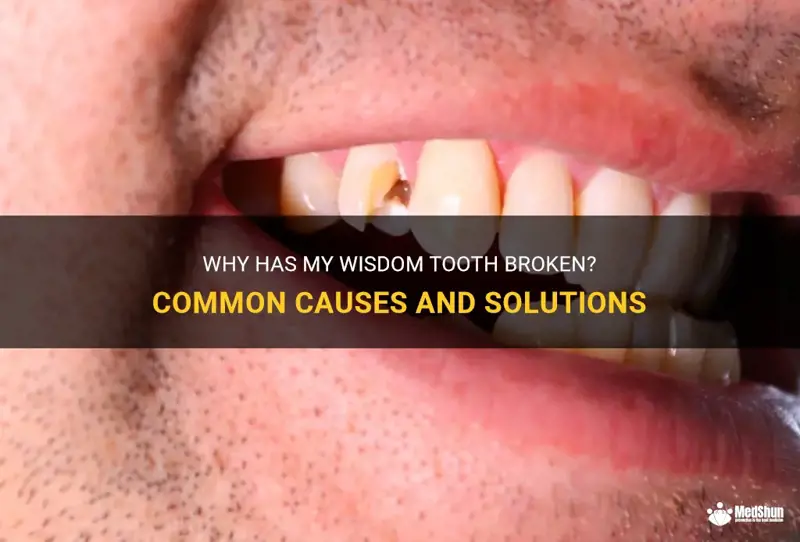Wisdom Tooth Broke

The sudden, sharp pain of a broken wisdom tooth can be a distressing experience, leaving individuals in a state of discomfort and urgency to seek relief. Wisdom teeth, also known as third molars, are the last set of teeth to erupt in the human mouth, typically appearing between the ages of 17 and 25. Despite their name, wisdom teeth often cause more problems than they solve, and their extraction has become a common dental procedure. When a wisdom tooth breaks, it can expose the pulp and nerve, leading to severe pain, infection, and potentially more serious complications if left untreated.
Understanding the Structure of a Wisdom Tooth
To comprehend the implications of a broken wisdom tooth, it’s essential to understand the basic anatomy of a tooth. A tooth is composed of several layers: the enamel, the hardest outer layer; the dentin, a softer layer beneath the enamel; the cementum, a thin layer covering the root of the tooth; and the pulp, the softest inner layer containing nerves and blood vessels. When a wisdom tooth breaks, the damage can extend to any of these layers, depending on the severity of the break.
Causes of a Broken Wisdom Tooth
Several factors can contribute to a wisdom tooth breaking: - Trauma: A direct hit to the mouth, such as from a fall or a sports injury, can cause a wisdom tooth to crack or break. - Decay: If a wisdom tooth has decayed significantly, it can weaken the tooth structure, making it more susceptible to breaking. - Gum Disease: Advanced gum disease can cause the bone supporting the tooth to deteriorate, leading to a loose tooth that can break more easily. - Teeth Grinding: Habits like teeth grinding (bruxism) can put excessive pressure on the wisdom teeth, potentially causing them to crack or break.
Symptoms of a Broken Wisdom Tooth
The symptoms of a broken wisdom tooth can vary depending on the extent of the damage but often include: - Severe Pain: Pain can be constant and severe, especially if the break has exposed the nerve. - Swelling and Inflammation: The gum around the broken tooth may become swollen and red. - Infection: Bacteria can enter the broken tooth, leading to an infection, which may cause fever, bad taste, or bad breath. - Difficulty Eating: The pain and discomfort can make eating certain foods, especially hard or chewy foods, very difficult.
Treatment Options for a Broken Wisdom Tooth
The treatment for a broken wisdom tooth depends on the extent of the damage. Possible treatments include: - Extraction: If the tooth is severely broken and cannot be saved, extraction may be the only option. This is often the case with wisdom teeth due to their location and potential for causing future problems. - Root Canal: If the break has exposed the nerve but the tooth can still be saved, a root canal might be performed to remove the damaged nerve and pulp. - Crown or Filling: For less severe breaks, a dentist might be able to repair the tooth with a crown or a filling, depending on the location and size of the break.
Preventive Measures
While accidents can happen, there are steps you can take to reduce the risk of a wisdom tooth breaking: - Regular Dental Checkups: Regular visits to the dentist can help identify potential issues before they become major problems. - Good Oral Hygiene: Brushing and flossing regularly, along with a balanced diet, can help prevent decay and gum disease. - Avoiding Harmful Habits: Refraining from habits like teeth grinding or using teeth as tools can reduce the risk of tooth damage.
Conclusion
A broken wisdom tooth is a serious dental issue that requires prompt attention to prevent further complications. Understanding the causes, recognizing the symptoms, and knowing the treatment options can help individuals navigate this painful situation. Regular dental care and preventive measures are key to avoiding such problems altogether. If you suspect you have a broken wisdom tooth, it’s crucial to consult a dentist as soon as possible to determine the best course of action for your specific situation.
What are the common symptoms of a broken wisdom tooth?
+Common symptoms include severe pain, swelling and inflammation around the tooth, difficulty eating, and potential signs of infection like fever or bad breath.
Can a broken wisdom tooth be prevented?
+While not all cases can be prevented, regular dental checkups, good oral hygiene, and avoiding harmful habits like teeth grinding can significantly reduce the risk.
What are the treatment options for a broken wisdom tooth?
+Treatment options vary depending on the extent of the damage and can include extraction, root canal, or repair with a crown or filling. A dentist will determine the best course of action based on the individual case.

